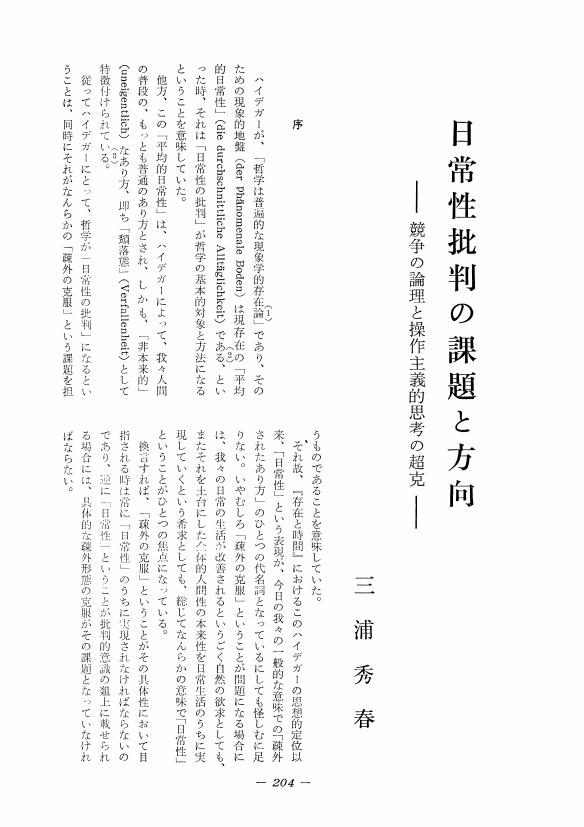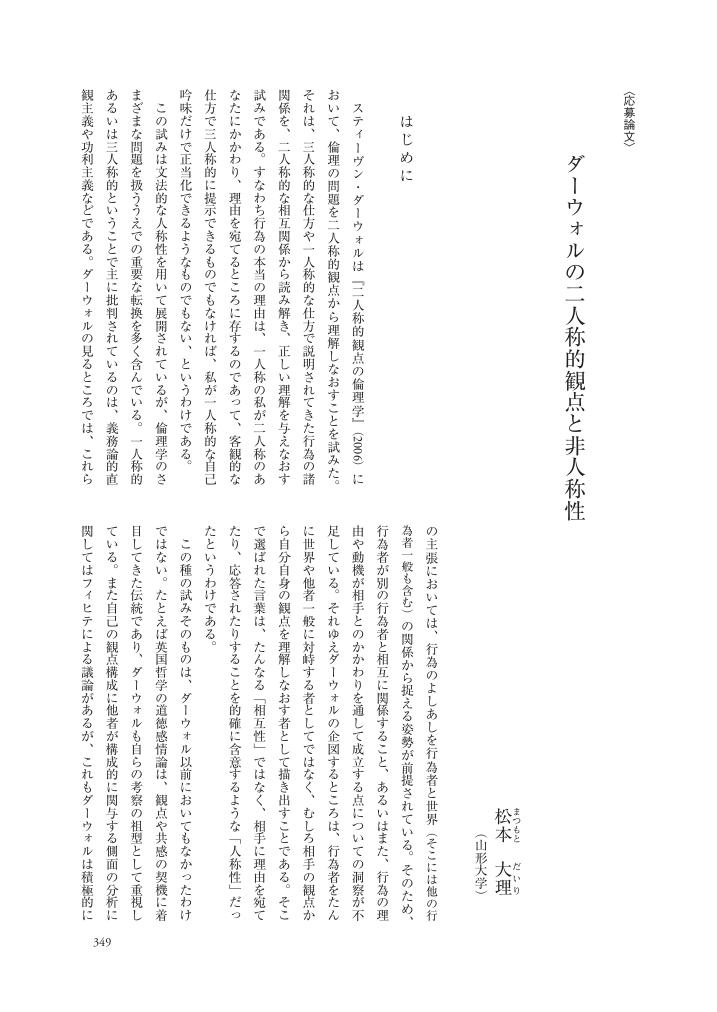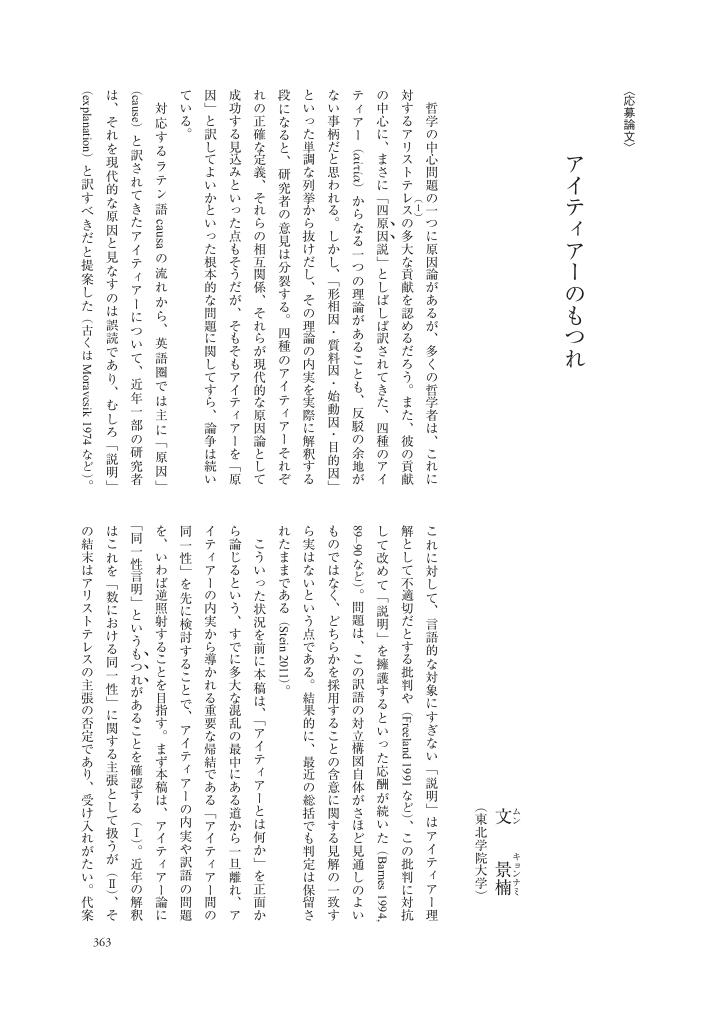- 著者
- 金 正旭
- 出版者
- 北海道大学哲学会
- 雑誌
- 哲学 (ISSN:02872560)
- 巻号頁・発行日
- vol.46, pp.1-15, 2010-03-21
1 0 0 0 OA アリストテレスのフィリア論 自己愛と友愛
- 著者
- 土橋 茂樹
- 出版者
- 日本哲学会
- 雑誌
- 哲学 (ISSN:03873358)
- 巻号頁・発行日
- vol.1990, no.40, pp.97-107, 1990-04-01 (Released:2009-07-23)
1 0 0 0 OA 屋良朝彦 『メルロ=ポンティとレヴィナス―他者への覚醒』(東信堂)
- 著者
- 大小田 重夫
- 出版者
- 北海道大学哲学会
- 雑誌
- 哲学 (ISSN:02872560)
- 巻号頁・発行日
- vol.40, pp.81-87, 2004-07-18
1 0 0 0 OA 無限判断と推論 ヘーゲルの推理論について(二)
- 著者
- 山口 祐弘
- 出版者
- 日本哲学会
- 雑誌
- 哲学 (ISSN:03873358)
- 巻号頁・発行日
- vol.1978, no.28, pp.164-176, 1978-05-01 (Released:2009-07-23)
1 0 0 0 OA 現代文明と人間の問題
- 著者
- 村上 陽一郎
- 出版者
- 日本哲学会
- 雑誌
- 哲学 (ISSN:03873358)
- 巻号頁・発行日
- vol.1984, no.34, pp.31-45, 1984-05-01 (Released:2009-07-23)
1 0 0 0 OA 現代における神の問題
- 著者
- 小川 圭治
- 出版者
- 日本哲学会
- 雑誌
- 哲学 (ISSN:03873358)
- 巻号頁・発行日
- vol.1973, no.23, pp.64-72, 1973-05-01 (Released:2009-07-23)
1 0 0 0 OA 日常性批判の課題と方向 競争の論理と操作主義的思考の超克
- 著者
- 三浦 秀春
- 出版者
- 日本哲学会
- 雑誌
- 哲学 (ISSN:03873358)
- 巻号頁・発行日
- vol.1972, no.22, pp.204-212, 1972-05-01 (Released:2009-07-23)
- 参考文献数
- 24
1 0 0 0 OA プラトンの『クラテュロス』における「名前の正しさ」
- 著者
- 中澤 務
- 出版者
- 日本哲学会
- 雑誌
- 哲学 (ISSN:03873358)
- 巻号頁・発行日
- vol.44, pp.166-175, 1994-04
1 0 0 0 OA 西田哲学の現在的意義について
- 著者
- 竹内 良知
- 出版者
- 日本哲学会
- 雑誌
- 哲学 (ISSN:03873358)
- 巻号頁・発行日
- vol.1970, no.20, pp.94-103, 1970 (Released:2009-07-23)
1 0 0 0 OA 煙から火を導出すること : トポス理論の観点から
- 著者
- 深山 洋平
- 出版者
- 北海道大学哲学会
- 雑誌
- 哲学 (ISSN:02872560)
- 巻号頁・発行日
- vol.52, pp.55-69, 2018-12-02
The first aim of this paper is to explicate the intention of a picture which was found on the introduction Web page of emeritus Koji Nakatogawa at Hokkaido University and which visualizes inference from seeing smoke at some place to the existence of fire there. It turns out that the picture is influenced from a book whose authors include mathematician F. W. Lawvere and that the intention is clarified by using Lawvere's elementary topos theory. The second aim is to point out a conflict between Nakatogawa's view that "static" set theory is opposed to "dynamic" category theory and Lawvere's conception of the topos of abstract sets and that of variable sets.
1 0 0 0 OA カント「沈黙」の十年の意義 現象概念の確立過程
- 著者
- 黒崎 政男
- 出版者
- 日本哲学会
- 雑誌
- 哲学 (ISSN:03873358)
- 巻号頁・発行日
- vol.1982, no.32, pp.104-115, 1982-05-01 (Released:2009-07-23)
近世哲学、特にいわゆる大陸合理論においては、感性は下位の認識能力とされるか、あるいは誤謬の直接間接の原因と看做されるのが常であった。真理は、精神から感性的なものをとりのぞく時に初めて得られるものであり、人間は知性によってのみ「永遠真理」の領域に達することができる。ところがカントの場合には、感性は誤謬の原因とされるどころかむしろ「実在的認識の源泉」として、そもそも認識が成立するための「不可欠な契機」とされている。つまり「純粋理性批判」 (以下KdrVと略す) によれば、認識は感性と悟性が合一することによって初めて成立する、とされているのである。感性が真理獲得のために不可欠であるとするカントの哲学観はしたがって、感性的なものを排除することによって真理が獲得できるとするカント以前の哲学観と大きく異なることは明らかである。本稿の目的は、このような哲学観が、一七七〇年の「就職論文」から一七八一年KdrV成立までの、著作のほとんど存在しないいわゆる「沈黙の十年」の思索において真に確立されたということを、七一・七二年のヘルツ宛て書簡や七五年の遺稿集である博 “Der Duisburg'sche Nachlass” などの考察を通じて明らかにすることにある。もちろん七〇年論文の段階でも、カントはすでに感性的なものを十分肯定的にとらえている。すなわち、感性的認識において質料と形式の対比から、時間・空間を何かがわれわれの感官の対象となり得るための形式の「主観的条件」 (Aka. II. S.400) として、また「純粋直観」 (ibid)としてとらえ、これを扱う「純粋数学」は「非常に判明」 (II. S.394f.) で「極めて真なる認識」 (II. S. 397f.) になり得るとされている。このように、七〇年論文において主張された「時空の主観性」説は、それだけを独立してみるならば確かにKdrVの超越論的感性論の思想とほぼ同一視することもできるかもしれない。このようなことから、七〇年論文は「悟性の実在的使用」が断念されればKdrVの思想に直結すると語られることが少なくない。確かにKdrVと七〇年論文を表面的に比較するならばこのような解釈もあやまちとはいえないだろうが、しかし私には不十分な解釈であるように思われる。つまり、この両著作の間には「経験」概念あるいは「現象」概念について微妙ではあるがしかし決定的な差違が存するように思われるからである。この決定的な変革を介してのみ、今のべたような哲学観が真に確立され得たと私は考えるのである。従って、両著作の関係についてさまざまな観点からの解釈が可能であろうが、本稿では、これまでほとんど取られたことのないと思われる観点、すなわち、沈黙の十年を現象概念の確立過程ととらえ、これを感性と悟性との関係を中心に考察を加えてみたいと思う。この考察を基にして KdrV を再解釈することが本来の目的ではあるが、紙面の関係上本稿ではこの点については若干の見通しを与えるだけで満足せざるを得ない。
1 0 0 0 OA 大会シンポジウム「人工知能・ロボットの哲学」報告
- 著者
- 村上 祐子 小山 虎
- 出版者
- 日本哲学会
- 雑誌
- 哲学 (ISSN:03873358)
- 巻号頁・発行日
- vol.2019, no.70, pp.7-13, 2019-04-01 (Released:2019-04-18)
1 0 0 0 OA 他人知覚と自己意識 サルトルからメルロ=ポンティへ
- 著者
- 滝浦 静雄
- 出版者
- 日本哲学会
- 雑誌
- 哲学 (ISSN:03873358)
- 巻号頁・発行日
- vol.1969, no.19, pp.22-47, 1969-03-31 (Released:2009-07-23)
- 参考文献数
- 46
Cet essai a pour but de chercher un ressource pour réfuter une forme du solipsisme dont on pourrait trouver le type dans la philosophie de J.-P. Sartre. Selon lui, toute conscience d'objet est en même temps << conscience non-thétique d'elle-même >> et, par conséquent, l'expérience du << Nous >> n'est qu'un fait psychologique de chaque individu qu'il est un d' << eux >> pour un tiers. Nous essayons donc dans cet essai de démontrer que sa conception de la << conscience (de) soi >> n'a pas raison, en tenant compte du fait que la prise de conscience de soi est en règle générale très difficile pour l'enfant. Car, ce fait ne serait pas indifférent au problème de la conscience (de) soi. Et nous pensons que, pour saisir correctement l'existence d'autrui, il faut avoir la notion juste du corps humain, et nous la trouvons dans la philosophie de M. Merleau-Ponty. Il constate par l' examen de la << sensation double >> le système de coexistence de mon corps avec le corps d'autrui, c'est-à-dire l' << intercorporéité >> où l'on pourrait restituer le bon droit de l'expérience du << Nous >> sujet.
1 0 0 0 OA 「現代における死」への覚書 ――脳死・臓器移植をめぐる「ノン・パンセ」――
- 著者
- 田中 智彦
- 出版者
- 日本哲学会
- 雑誌
- 哲学 (ISSN:03873358)
- 巻号頁・発行日
- vol.2010, no.61, pp.9-24_L3, 2010 (Released:2011-01-18)
- 参考文献数
- 15
In May 2009, when the debate about a bill to amend the Organ Transplantation Act began, 71 university scholars engaged in bioethics education and research, formed a voluntary association named “Seimei-Rinri Kaigi”, and made an urgent appeal for thorough study and deliberation before voting on the amendment. This statement warned of fundamental defects in existing concepts of “brain death” and “organ transplantation”. However, the Diet passed the bill without responding in any way to the appeal.In this paper, I discuss “non-pensée” over “brain death” and “organ transplantation”, and suggest that it underlies our discourses about death, particularly in the following areas; 1) the confusion between “death” and “standard of death”, 2) the return of “Vernichtung Lebensunwerten Lebens”, 3) the reduction of “ethics” to “law”, 4) the biotechnological public exploitation of our bodies, and 5) the biopolitical aspect of care. I think these are unavoidable themes if we reflect on present discourses about death.
1 0 0 0 OA 反省の問題は本当に問題なのか フッサール初期時間論の再検討
- 著者
- 佐藤 大介
- 出版者
- 日本哲学会
- 雑誌
- 哲学 (ISSN:03873358)
- 巻号頁・発行日
- vol.2019, no.70, pp.220-234, 2019-04-01 (Released:2019-04-18)
- 参考文献数
- 11
Are we able to capture just the working consciousness by reflection? Several Husserl researchers to date have answered no to this question. This is serious for Husserl phenomenology. This is because Husserl phenomenology is an academic discipline to analyze the workings of consciousness, using reflection as the basic method. If it is impossible to capture just the working consciousness by reflection, the phenomenological approach will leave unknown the most crucial data. In this way, the problem of the discrepancy between the method and purpose of Husserl phenomenology has been repeatedly pointed out and widely shared in Husserl research since Klaus Held was first discussed. This problem is “the problem of reflection”. However, as some of the previous studies have acknowledged, Husserl himself does not explicitly address the problem of reflection. This seems strange. It is extremely natural to ask whether or not it is possible to capture just the working consciousness by reflection since it is the methodological core of Husserl phenomenology. So did Husserl adopt it as the basic method for phenomenology without carefully examining it? Given the fact that Husserl dealt with phenomenological methods thematically many times, that is hard to believe. Rather, I suppose that Husserl phenomenology has an argument that answers yes to the above question. In this paper, unlike many previous studies, I discuss Husserl’s early theory of time up to the early 1910’s, not the late theory of the 1930’s. Because there seems to be something overlooked or misunderstood in the opinion of the previous studies on Husserl’s early theory of time. They consider that just a working consciousness can be captured only by a subsequent reflection. However, Husserl insists that the working consciousness is captured by reflection now. In this case “now” is not a momentary “now”, but a “wide range” now.
1 0 0 0 OA プロティノスの擬似質料・形相論
- 著者
- 豊田 泰淳
- 出版者
- 日本哲学会
- 雑誌
- 哲学 (ISSN:03873358)
- 巻号頁・発行日
- vol.2022, no.73, pp.331-348, 2022-04-01 (Released:2022-07-21)
- 参考文献数
- 24
1 0 0 0 OA ダーウォルの二人称的観点と非人称性
- 著者
- 松本 大理
- 出版者
- 日本哲学会
- 雑誌
- 哲学 (ISSN:03873358)
- 巻号頁・発行日
- vol.2022, no.73, pp.349-362, 2022-04-01 (Released:2022-07-21)
- 参考文献数
- 15
1 0 0 0 OA アイティアーのもつれ
- 著者
- 文 景楠
- 出版者
- 日本哲学会
- 雑誌
- 哲学 (ISSN:03873358)
- 巻号頁・発行日
- vol.2022, no.73, pp.363-374, 2022-04-01 (Released:2022-07-21)
- 参考文献数
- 6
1 0 0 0 OA リクール『他としての自己自身』における「自己の証し」概念の再検討
- 著者
- 山野 弘樹
- 出版者
- 日本哲学会
- 雑誌
- 哲学 (ISSN:03873358)
- 巻号頁・発行日
- vol.2022, no.73, pp.375-390, 2022-04-01 (Released:2022-07-21)
- 参考文献数
- 6
1 0 0 0 OA ジャン・ヴァールの思想と実存の哲学 循環する超越と内在
- 著者
- 押見 まり
- 出版者
- 日本哲学会
- 雑誌
- 哲学 (ISSN:03873358)
- 巻号頁・発行日
- vol.2022, no.73, pp.176-193, 2022-04-01 (Released:2022-07-21)
- 参考文献数
- 16











